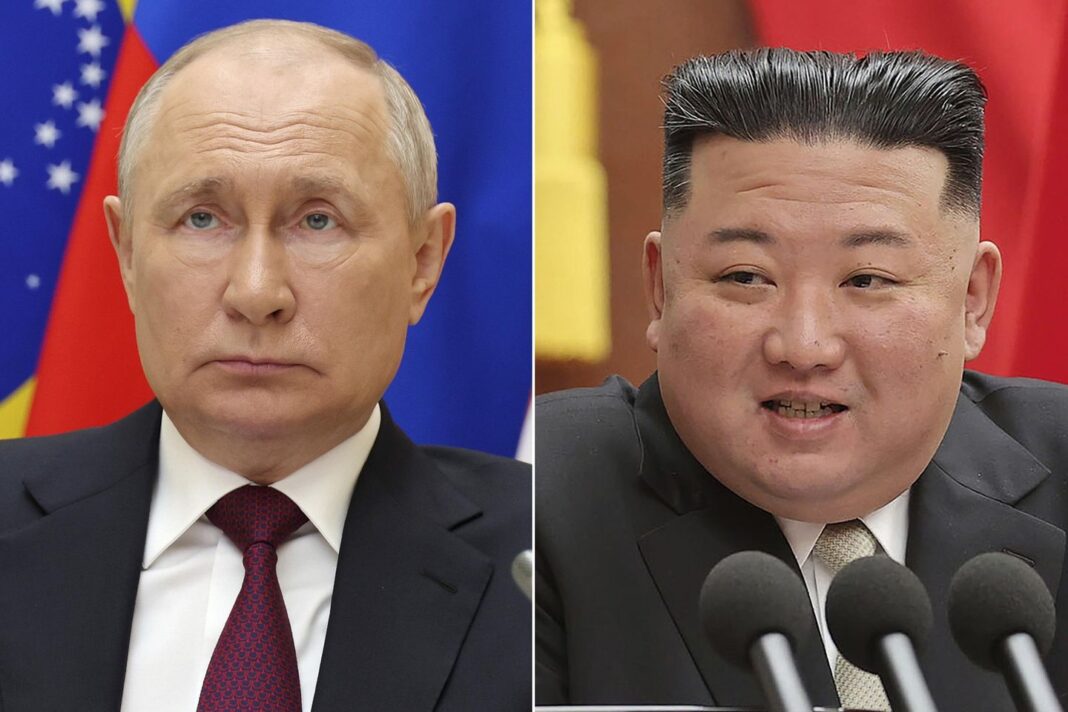The Daily Observer London Desk: Reporter- Jack Brumby
Russian President Vladimir Putin has exchanged letters of support and cooperation with North Korean leader Kim Jong Un as the Kremlin scrambles to find additional sources of weapons and ammunition for its war in Ukraine, the Biden administration confirmed Wednesday.
Russian Defense Minister Sergei Shoigu recently made a high-profile trip to North Korea for talks with Mr. Kim. High-level arms negotiations between Moscow and Pyongyang are now “actively advanced” and may continue in the coming months, National Security Council spokesman John Kirby told reporters. Iran has also actively supplied Russian forces in Ukraine with low-cost military drones.
“Russia would receive significant quantities and multiple types of munitions from [North Korea], which the Russian military plans to use in Ukraine,” Mr. Kirby said. “The potential deals could also include the provision of raw materials that would assist Russia’s defense industrial base.”
Mr. Kirby warned North Korea that supplying Russia with offensive weapons would “directly violate” a number of U.N. Security Council resolutions. Moscow is particularly interested in locating more artillery rounds because of the nature of the fighting in Ukraine, Mr. Kirby said.
“What we’re seeing in [the current Ukrainian counteroffensive] is a gunfight. Both sides are blazing away with artillery,” he said.
The accusations came on after a night in which Ukraine sent waves of drones deep across the border into western Russia in a four-hour salvo, the Associated Press reported Wednesday. With at least six regions targeted, the wire service noted, the barrage ranks as perhaps the most ambitious Ukrainian drone attack on Russian soil since the war began 18 months ago.
Some of the Ukrainian drones hit an airport near Russia’s border with Estonia and Latvia, causing a huge blaze and damaging four Il-76 military transport planes, the Russian state news agency Tass reported.
That Russia is asking for military hardware from countries like North Korea and Iran is a marked change from the Cold War era when the Soviet Union supplied weapons to Marxist governments and revolutionary armies around the world. President Vladimir Putin has achieved none of his strategic goals since he launched the war against Ukraine almost two years ago, Mr. Kirby said.
“He has lost tens of thousands, if not hundreds of thousands, of troops either killed or wounded in this war. Now, he’s reaching out to Iran for drones and he’s reaching out to North Korea for artillery,” he said. “It’s hard to look at any of that and come away thinking that Mr. Putin is somehow stronger or he’s better positioned.”
Along with a lack of artillery ammunition, Russia is apparently having problems finding sufficient soldiers for combat operations in Ukraine. Despite making military service highly lucrative — a junior soldier in combat is paid almost three times the national average for civilian workers — Russian troops are increasingly going AWOL from the front lines.
Prosecutors filed criminal charges against more than 2,000 soldiers accused of fleeing their posts in the first half of 2023. That’s more than twice the number of AWOL cases for the entire previous year, Russian independent media said.
Mediazona, a Russian news outlet that has criticized Mr. Putin’s war in Ukraine, said opposition in the ranks is driving the growing number of desertions in the armed forces. The company said they based their analysis on a study of Russian court decisions.
“The majority of these sentences are suspended, thereby enabling the command to send violating soldiers back to the front lines,” Mediazona reported.
Last week, two Russian soldiers were sentenced to two years in a penal colony for refusing to return to their units in Ukraine. Their refusal to fight likely reflects a lack of motivation and adequate training along with the ongoing stress that Russian troops face along the front line in Ukraine, British military officials said Wednesday.
“Although some soldiers have refused to fight and attrition rates remain high, Russia likely mitigates their loss by committing a mass of poorly trained soldiers to the frontline,” British officials said on X, formerly Twitter, in their latest assessment of battlefield conditions in Ukraine.



